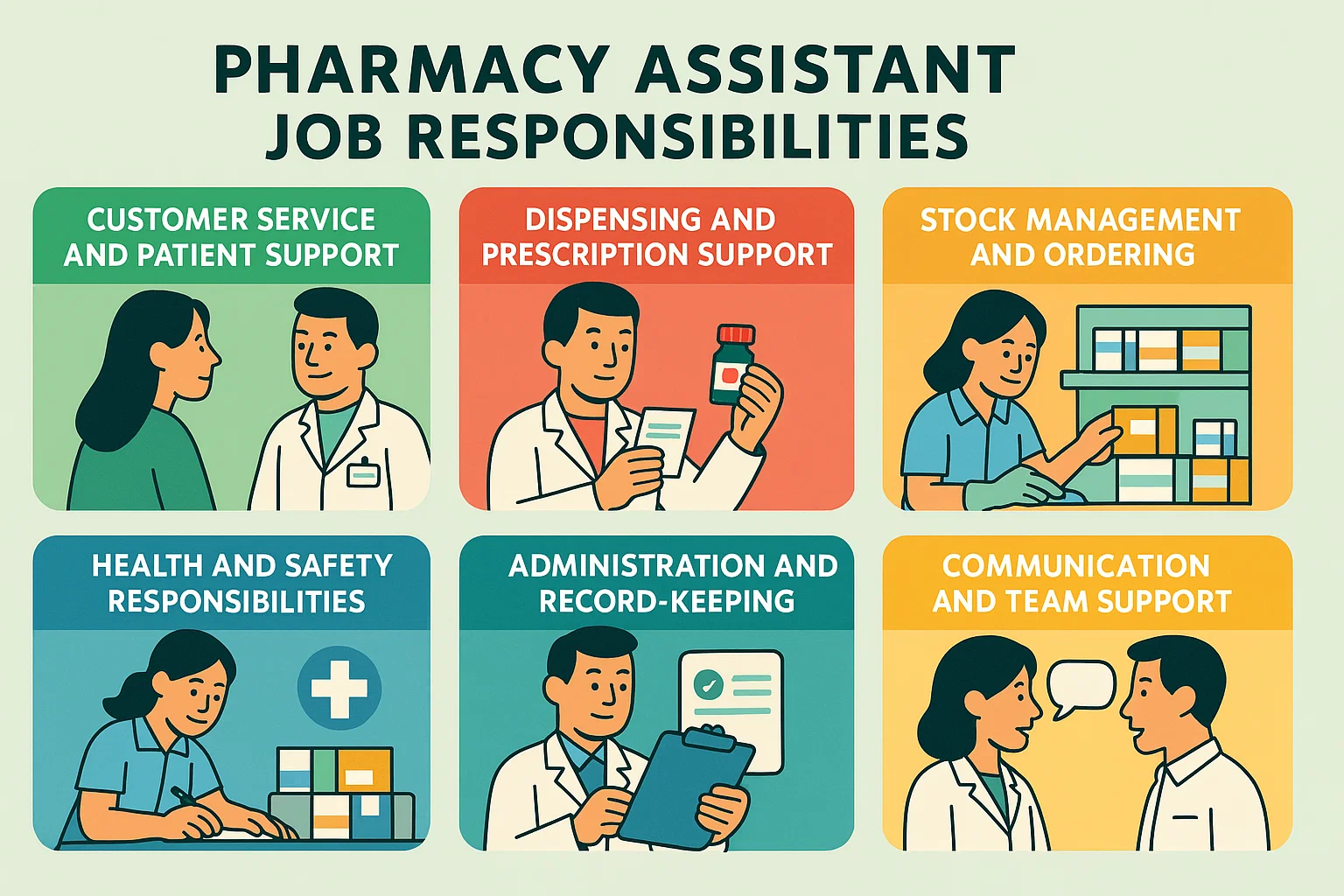No products in the basket.
Let’s talk about pharmacy assistant job responsibilities — what does this role really involve?
A pharmacy assistant plays a key part in helping pharmacists and pharmacy technicians deliver safe, efficient, and friendly service. Whether they’re working in a busy hospital or a small community pharmacy, their main goal is to support patients and keep things running smoothly.
Most of the work follows clear Standard Operating Procedures (SOPs) to make sure every task is done correctly and safely. They also use a Patient Medication Record (PMR) system to handle prescriptions and patient information. Because this data is sensitive, it’s crucial that they follow UK GDPR rules and always respect patient confidentiality.
They help prepare and label medicines, keep stock organised, answer customer questions, and support both NHS and private services. They’re often the friendly face people see first when they walk in — ready to help with care and a smile.
Overall, it’s a role built on teamwork, accuracy, and compassion — one that truly makes a difference in people’s health and well-being every day.
Pharmacy Assistant Job Responsibilities

1) Customer Service and Patient Support
When it comes to customer service, a pharmacy assistant is often the first friendly face patients see. It’s all about making people feel welcome and cared for from the moment they walk in.
A big part of the job is talking with patients and asking simple questions — like WWHAM (Who, What, How long, Action taken, and Medication used) — to understand their minor health concerns. This helps you figure out what they need, while keeping things safe and professional.
Of course, you should only give basic advice that’s within your training and comfort zone. If someone’s symptoms seem serious or you notice any red flags, it’s important to refer them straight to the pharmacist. That teamwork helps make sure every patient gets the right care.
You’ll also handle payments, so it’s essential to do that securely and politely, making every customer feel respected and looked after.
In short, great customer service in the pharmacy is about kindness, clear communication, and knowing when to ask for help — because every small action makes a big difference to someone’s health and day.
2) Dispensing and Prescription Support
In this part of the job, accuracy really matters. As a pharmacy assistant, you’ll help with dispensing medicines safely and carefully, always following the right steps.
You’ll start by printing the prescription label from the Patient Medication Record (PMR) system, then select the correct medicine, making sure the strength and form match exactly what’s on the prescription. Every detail counts — even small mix-ups can cause big problems.
Next, you’ll attach any cautionary or advisory labels, so patients know how to use their medicine properly and safely. Once everything looks good, you’ll present the items to an authorised checker or pharmacist for the final check before handing them to the patient.
It’s also important to verify patient details and keep accurate records throughout the process. This helps maintain trust, safety, and smooth communication within the pharmacy team.
In short, this part of your work is all about focus, responsibility, and teamwork — making sure every prescription is handled with care from start to finish.
3) Stock Management and Ordering
Keeping the pharmacy well-stocked and organised is another big part of the job. As a pharmacy assistant, you’ll help make sure every medicine is stored safely and ready when patients need it.
You’ll rotate stock regularly — following the FEFO rule (First Expiry, First Out) — so that older medicines are used before newer ones. It’s also important to check expiry dates and remove anything that’s out of date.
Different medicines need different storage conditions. Some stay at room temperature, while others must be kept in a fridge between 2–8°C. Paying attention to this keeps medicines safe and effective.
You’ll also help manage owes, back-orders, and returns, making sure the pharmacy always knows what’s in stock and what needs to be ordered. Plus, you’ll support routine audits and compliance checks — these help the pharmacy meet legal and safety standards.
In short, stock management is all about being organised, careful, and proactive. When everything’s in the right place and up to date, the whole team can focus on what matters most — caring for patients.
4) Health and Safety Responsibilities
Health and safety are a big deal in any pharmacy. As a pharmacy assistant, it’s your job to help keep the workplace clean, safe, and well-organised so everyone — staff and patients — stays protected.
You’ll start by keeping all work areas clean and hygienic, wiping down surfaces and tidying up regularly. It might sound simple, but a clean space helps prevent mistakes and makes a great impression on patients, too.
It’s also important to follow infection control procedures — like washing hands often, using gloves when needed, and handling medicines carefully. These small actions go a long way in keeping everyone safe.
If something ever goes wrong — like a near-miss or an incident — you should report it straight away. Quick reporting helps the team fix problems and stop them from happening again.
And when it comes to Controlled Drugs, you must follow the Standard Operating Procedures (SOPs) exactly. These medicines need to be stored, handled, and recorded with extra care because of how strong and regulated they are.
In short, health and safety are all about being alert, responsible, and caring — protecting people while helping the pharmacy run smoothly.
5) Administration and Record-Keeping
Behind the counter, there’s more to the job than just helping customers. A big part of being a pharmacy assistant is keeping everything organised and up to date.
You’ll help update the Patient Medication Record (PMR) and keep files in order, making sure all information is easy to find when needed. You’ll also process NHS forms and exemption claims, double-checking that everything is filled in correctly before it’s sent off.
Another key task is supporting Electronic Prescription Service (EPS) prescriptions and deliveries, so medicines reach patients quickly and safely — especially those who rely on home deliveries.
And of course, you’ll always handle patient details with care, following UK GDPR rules to protect their privacy. Keeping data secure isn’t just a rule — it’s a sign of respect and trust.
In short, good record-keeping keeps the whole pharmacy running smoothly. It’s about being careful, organised, and dependable — the quiet work that makes a big difference behind the scenes.
6) Communication and Team Support
Good communication is at the heart of every great pharmacy team. As a pharmacy assistant, you’ll talk with pharmacists, technicians, GP surgeries, and patients every day — so being clear, polite, and professional really matters.
You’ll often need to share important information, especially when it involves patient safety. Always make sure your handovers are precise and accurate, so nothing gets missed or misunderstood. Even small details can make a big difference in someone’s care.
You may also help new starters or volunteers find their way around, showing them how things work and making them feel welcome. It’s all part of being a supportive, team-focused colleague.
In the end, great communication keeps everything running smoothly — it builds trust, prevents mistakes, and helps everyone work together to give patients the best care possible.
7) Optional Tasks in Some Pharmacies
In some pharmacies, you might get the chance to take on a few extra responsibilities — depending on your training and what the pharmacy offers. These tasks help you grow your skills and support your community even more.
For example, you could assist with vaccination clinics, helping with admin work or patient flow to keep things running smoothly. If you’ve been properly trained, you might also take blood pressure (BP) checks, giving patients a quick and friendly service while helping monitor their health.
Some pharmacies also run public health campaigns — like promoting flu jabs, healthy eating, or quitting smoking. You can play a part by sharing information and encouraging people to get involved.
And occasionally, you might help with in-store displays or simple social media updates, following your manager’s direction. It’s a great way to keep the pharmacy looking inviting and connected with the community.
Overall, these optional tasks add variety to your day and show how pharmacy assistants do so much more than just dispense medicine — they help keep the whole community healthier and happier.
Skills You Need to Be a Good Pharmacy Assistant
Being a great pharmacy assistant is not just about the tasks you do — it’s about the skills and attitude you bring to the job.
- Accuracy and Attention to Detail: Every label, medicine, and record must be correct. Being careful and focused helps keep patients safe and the pharmacy running smoothly.
- Clear Communication and Empathy: You’ll often speak with people who may feel unwell or anxious. Listening, showing kindness, and explaining things clearly can make a big difference.
- Basic Maths and IT Skills: From handling payments to using the pharmacy computer system, these skills help you work efficiently and avoid mistakes.
- Teamwork and Reliability: Pharmacies rely on teamwork. Being dependable and supportive helps everyone get through busy days together.
- Professional Conduct: Always act respectfully and responsibly. A calm, positive attitude shows professionalism and earns patients’ trust.
- Strong Confidentiality: You’ll handle sensitive patient information every day. Protecting that privacy is one of your most important duties.
Training and Qualifications
Entry Requirements
Most pharmacy assistants start with GCSEs or equivalent, usually in English and Maths.
On-the-Job Training
You’ll often train while working, learning from experienced staff and completing a Level 2 Certificate in Pharmacy Service Skills.
Progression
With experience, you can move on to a Level 3 Diploma in Pharmacy Services, which can lead to more advanced roles, such as a pharmacy technician.
Checks and Safety
Some positions, especially in hospitals or with vulnerable groups, may require an enhanced DBS check.
Typical Workplaces
Pharmacy assistants can work in many different settings. Most are based in community pharmacies such as Boots, Lloyds, or Superdrug, helping local customers every day. Others work in NHS hospitals or clinics, supporting busy healthcare teams. Some are based in GP surgeries or health centres, while others help manage orders for online or mail-order pharmacies. Wherever they work, their focus stays the same — providing safe, friendly, and reliable support to patients.
Pay and Career Progression
When starting out, a pharmacy assistant usually earns around £20,000–£23,000 a year. With more experience and training, this can rise to £26,000 or more, depending on the region and employer.
There are also great opportunities to move forward. Many assistants train to become registered Pharmacy Technicians, or progress to roles like Dispensary Supervisor or Pharmacy Manager. With dedication and learning, there’s plenty of room to grow.
Final Thoughts: Why Pharmacy Assistants Matter
At the heart of every pharmacy are the people who make it all work. Understanding pharmacy assistant job responsibilities shows just how vital this role is. Pharmacy assistants help keep medicines safe, accurate, and easy to access, freeing pharmacists to focus on clinical care.
It’s a hands-on, people-focused job that combines care, organisation, and teamwork. With clear training paths, steady demand, and the chance to make a real difference every day, it’s a role that truly matters across UK healthcare.
Learn key pharmacy assistant job responsibilities and build your future — enrol now in the Pharmacy Assistant Technician Course at Training Tale!




